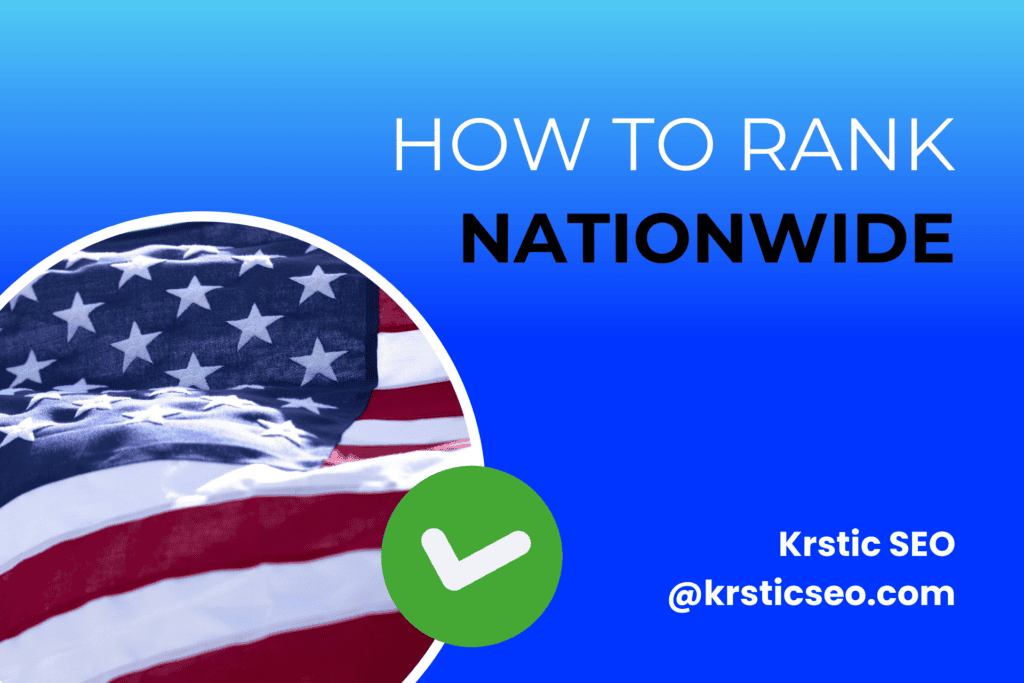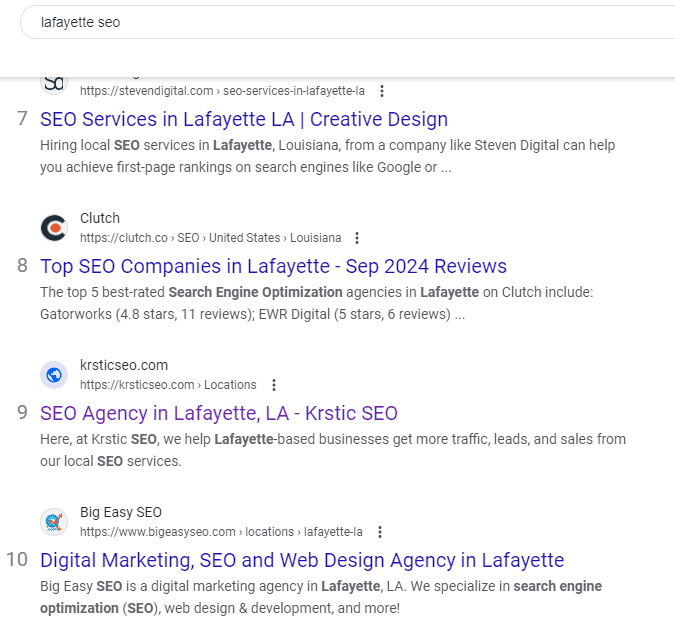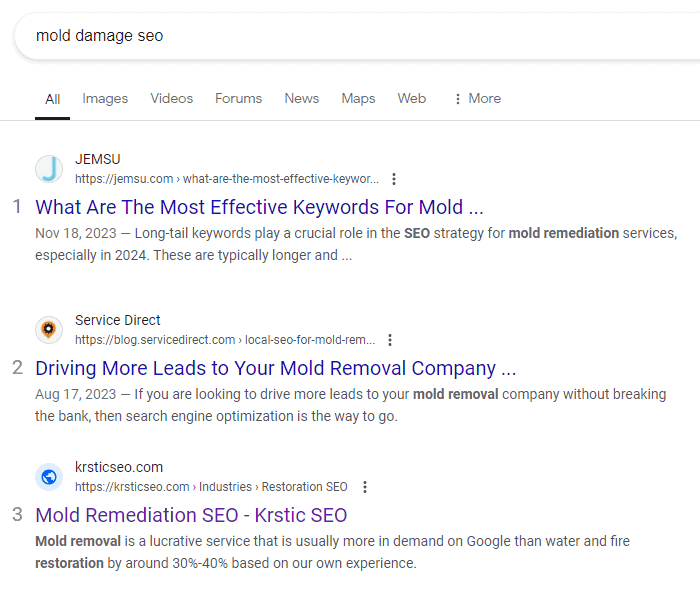Ranking nationally doesn’t differ that much from ranking locally.
In fact, advanced SEOs can sometimes leverage both for their nationwide SEO clients.
In this article, you’ll learn how to dominate your industry and rank all over the country for the products and services you’re selling.
You’ll also learn about conversion rate optimization and sales-funneling your users by leveraging keywords searched by users at different buyer’s journey stages.
Let’s get into it!

~6 Minute Read
Quick Answer
Nationwide SEO relies on three major types of SEO strategies, depending on the type of business: local SEO (spread over thousands of cities), informational SEO (ranking for question-based keywords), and commercial SEO (ranking for product- or service-based keywords not tied to any location).
What Exactly Do You Want to Rank Nationally for?
If you’re reading this article, you’re most likely coming with an idea of ranking for something, whatever that might be.
What is that it?
- A product
- A service
- Multiple products
- Multiple services
- Both products and services
Maybe your goals aren’t necessarily sales-based right off the bat. Instead, you might want to:
- Hire through SEO (so-called “recruitment SEO”)
- Spread a message (an NGO, an activist group, a PR group, a political party, etc.)
- Attract investors for your idea
- Clear your name when it’s Google-ed (or your company’s name)
- Attract donors for your non-profit
Regardless of the goal, you’re “selling” anyway (you’re selling your ideas, your actions, your company), and the means for achieving that through SEO are mostly the same.
So, let’s get into the three different aspects of any crazily successful national SEO campaign: local SEO, informational SEO, and commercial SEO.
How to Leverage Local SEO in National Campaigns
You may have read our guide on how to rank higher on Google Maps. While this guide is mostly for one-location small mom and pop shops, it can still be helpful for nationwide brands.
Instead of one location, you might have dozens, or even hundreds of locations across the country.
The rules of the game are the same for you; the difference (a huge one, to be honest) is in the scale of work required:
- Instead of managing one Google Business Profile, you’ll need to run hundreds of them
- Instead of building a small local site with 10-20 pages, you’ll need hundreds or even thousands of pages
And this is okay, and as long as you do it right, the results can be quite impactful. Here’s what you want to do:
Location Pages
A location page is a landing page on a website targeting a local SEO keyword (or keywords).
Think of keywords like:
- “Plumber Miami”
- “Roofer Dallas”
- “Chiropractor Beverly Hills”
Read our full guide on how to make location pages.
Now, the role of location pages in national SEO is simple—you’ll build hundreds of them.
Regardless of the type of business you are and whatever you might be selling, you can leverage location pages.
Even we, as a completely remote business, leverage location pages to rank for keywords like:
- “Denver SEO”
- “Dallas SEO”
- “Los Angeles SEO”
Check one of our location pages we linked above to see what we’re doing. It works!
At the time of writing this article, we’ve already managed to rank in some cities for SEO.

People look for local keywords all the time. In fact, almost a half of all Google searches are local. A HALF!
You don’t want to be missing out on half of your potential customer base, do you?
State-based Keywords
Some niches have keywords looked up with a state “modifier,” rather than a city one.
Think of keywords like best homeowners insurance in Florida.
It takes proper keyword research to find these keywords, and then URL structure so that you can rank BOTH for state and city keywords with ease.
Real estate companies could be dealing with county keywords as well, and maybe even neighborhood-based keywords, like condos for sale Upper East Side.
How to Rank for Informational Keywords Nationally
Whenever someone Google’s a question, especially a generic question:
- How to rank number one on Google?
- How to quit cigarettes?
- How to lose weight?
Pretty much the same results show up, regardless of the location of the searcher (exceptions apply; more on this later).
So, as a national brand, you don’t want to miss out on these types of keywords.
Many of these keywords have thousands or even tens of thousands of users Google-ing them every single month.
Converting just a fraction of them into your customer base could be very lucrative, and here’s how to do it.
Keywords from Different Buyer's Stages
I like to use the example of three sales funnel stages on this website. There are:
- Top of funnel keywords: Keywords Google-ed by someone who just became aware of their problem, need, or desire. Think of keywords like what is SEO, does being fat cause back pain, or is benzodiazepine addictive.
- Middle of funnel keywords: These are the keywords I stated at the beginning of this paragraph, like how to rank on top of Google. Middle of funnel keywords show us, the advertisers, that the user is somewhat into the topic, as he’s passed the awareness mode and is now in the interest mode. Near the end of this stage, users might be searching for keywords like is SEO worth it, best protein powder for elderly, and costs of roof replacement.
- Bottom of funnel keywords: You’re now dealing with people ready to take action—buy a product, hire a plumber, or donate money. Bottom of funnel keywords are usually the most competitive, and they include keywords like plumbers near me (pretty much all local SEO keywords could be considered bottom of funnel keywords), steroids for sale, and payday loans no income verification.
In your informational keyword strategy, you want to hit all of these, creating content that will rank for all three types of funnel keywords.
Then, through internal linking, you want to “funnel” your users to your money pages (likely bottom of funnel pages), so that you can sell to them even without ranking for a “money” keyword.
A solid example of this is right in your face—if you’re struggling with your national SEO, reach out to us for a free website audit and let’s take it from there.
Location- AND Informational-based Keywords
Remember the exceptions I mentioned earlier?
Well, here they are—a mix of informational and local SEO keywords.
These refer to questions specific to a location that you could also answer.
For example, movers could benefit by ranking for:
- Is Los Angeles a safe city?
- Is Los Angeles a good place to live?
- Cost of living in Los Angeles
And then, immigration law firms may benefit from ranking for:
- How to get a job in Los Angeles as a foreigner?
These were just the ideas that came off the top of my head. Not that I am a genie, but it takes a bit of creativity and thinking about your audience and how they’re thinking.
These keywords can all be easily found through keyword research as well.
How to Rank for Commercial Keywords Nationally
And the last part of the equation is perhaps the most important one – commercial keywords.

There are different types of commercial keywords you want to target, depending on the business:
- eCommerce keywords, AKA product keywords. This is mostly for online shops.
- Non-local service keywords, AKA keywords not bound to any location (for example, nationwide SEO services or medical translation services).
- Local service keywords, AKA keywords tied to a location (for example, roof replacement Miami).
If you’re an eCommerce store, know that it’s possible to outcompete Amazon and Walmart. Yes, they’re giants, but many buyers love stores specific to one or a few coherent industries.
If you’re selling services, it’s going to be different for you if your services are bound to a location or not. In the first case, you’ll need a lot more landing pages that would be a “2nd level” to the location pages you’ve made in the stage covered above.
For clarification, your page links would look something like this:
- domain.com/los-angeles/web-design
- domain.com/los-angeles/roof-replacement
- domain.com/los-angeles/hvac/ac-repair
That’s what I mean by “2nd level” service pages. And these take a lot of time to build and domain authority to successfully rank.
Larger commercial gigs worth five, six, or even seven figures could perhaps not be reliant on a location, or at least not on a specific city (they could instead be state-based, as covered before). Examples:
- Hurricane restoration companies
- Healthcare call center
- Payday loans for bad credit
Determining this demands very in-depth keyword research AND audience understanding.
- Is a New York hotel owner willing to wait a day for a company from Illinois to come and replace their entire plumbing system, or does he want it done locally ASAP?
Congrats!
If you’ve read this far, you’ve just gone through the most difficult stage of figuring out how to rank nationally with SEO.
Yes, it’s hard. That’s partially why we get paid, hehe.
But seriously, getting your initial research and website strategy right will make the rest of the process a breeze.
And now, onto the link building.
Link Building
I won’t stick around here that long, especially cuz’ we have an entire article about this topic (check our link building guide here).
Yes, it’s written primarily for local SEO, but the principles are pretty much the same.
As you build out your site, you show have an equivalent number of backlinks pointing to it.
There’s not a golden ratio, but if you have 200 pages, try to get 50-100 domains pointing to your website. It will “make sense” in Google’s eyes then rather than having 0 backlinks, as Google tends to associate a lot of pages with prominence, one of the biggest ranking factors for companies.
If you’re a larger brand, start with citations and social profiles for each of your real office locations. Then, move onto the powerful backlinks like expert roundups.
Again, check out the guide to see what we mean. There’s plenty of in-depth explanations of different types of backlinks there.
What to Do from Here
So, you’re ready to compete amongst top players on Google?
If yes, you’ll need to a top-level roster of all-stars to run your SEO for you.
What we’ve just described in this article is demanding and requires a lot of writing, outreach, more writing, and more outreach.
Better let us handle everything for you while you focus on other operations in your business or other types of marketing (like paid ads, for example).
Ready to get started? Claim your free audit and let’s get going!

Bogdan is a local SEO expert with over 3 years of experience helping businesses grow using Google. When he is not helping businesses grow, he works on his own SEO projects, works out, takes long walks, and watches Suits, which is completely ironic given how rarely he dresses up in a suit himself.
